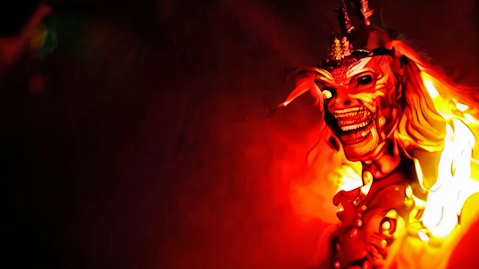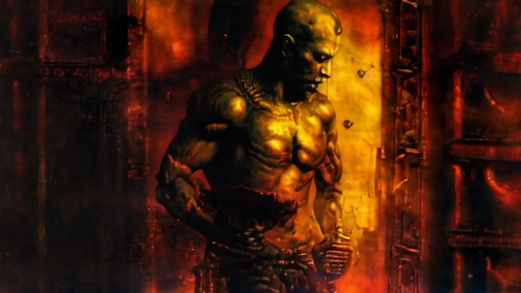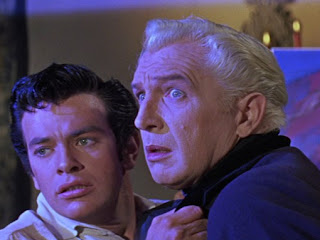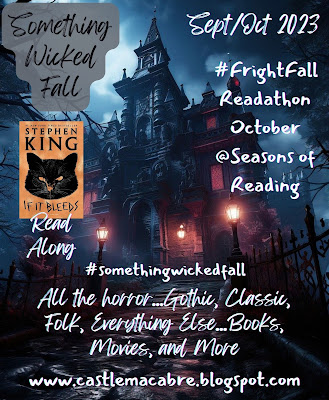Today I'm featuring the upcoming 2024 release, The Night Slayer from creator Michael McQuown.
Below is a Q & A with the creator. Be sure to check out the trailer at the end of the post.
Just before graduation from college in spring of 1990, a couple I knew wanted me to call their single female friend in the fall as both of us were moving to DC. About a month after arriving in DC, I hadn’t called her yet. I think I misplaced her number as this is pre-cell phone time.
One night I met two college buddies at an irish bar in Capital Hill. It was a weeknight and very slow. The entire time they were talking about people from work, none of whom I knew at all. After about 30 minutes of boredom, I did something I almost never do. I went up to a woman sitting at the bar by herself. We talked for quite awhile without exchanging names. Suddenly, it hit me. I said your name is such and such. She looks at me shocked. Turns out it was the woman I was supposed to call.
A few nights later, while trying to fall asleep, I thought what if she disappeared after that night. The police would never believe my story in that a city of 700,000+ that I randomly talked to the one person I was supposed to call (without even knowing it was her!).
So that’s the genesis of this murder-mystery. A guy talks to a woman that mutual friends are setting-up who then vanishes. Of course the police would suspect him. Over the course of many sleepless nights I pieced together the details of the story and plot way back late in 1990.
HOW DID YOU END UP SHOOTING FOR 30 YEARS?
I am pretty sure The Night Slayer is the only narrative (that is, non-documentary) film shot with the same actors over multiple decades. The shoot was mostly done on and off from 1993-1995. And then I shot additional footage with one of main actors, Paul Webster, in 2023. So for 26 of the 30 years there was no filming.
I made a cut in 1998 to show agents and managers, but no one would sign me because of an upcoming WGA writers strike. So it’s ironic that now it’s finally done in 2023, we are in another WGA strike! During the 2000’s, I thought maybe I could put the film on YouTube or something like that. But after reading about Neural Reconstruction and what early A.I. could do during COVID lockdowns, I realized we had a plot point that would justify the look and style of the film.
I got in touch with Paul Webster after many years and drove up to his house in Delaware from Florida to shoot the 2023 footage over two days. The 90’s footage I had a crew of one – just producer Melissa Robison and myself. The 2023 footage I shot with no crew, just myself.
WHAT EXACTLY IS "NEURAL RECONSTRUCTION" IN THE FILM?
Neural Reconstruction is a real-world science that is, for lack of a better descriptor, mind-reading by a computer. Since 2011, computers have been able to interpret with increasing accuracy, fidelity and resolution what you seeing into still photos and now video by analyzing brain scans in real-time. They can also synthesize speech accurately that you are just thinking, as well interpret stories from what you are listening to. The Night Slayer uses this as a plot point for the 1990’s footage.
What we shot in 2023 hypothesizes that in 2024 you can be hooked up to a portable Neural Reconstruction scanner that will output something like a grainy, surreal, independent art-house-like movie. Paul Webster, playing the same character I shot him as in the 1990’s, is now being paid in 2024 to read a script about events that happened to him 30 years ago in 1994, the idea being if it really happened to you then the computer will reconstruct a more accurate video output.
With this concept, I now had a reason why the footage of the 1990’s looks the way it does, as well as the use of tilted dutch angle camera shots, jump cuts, mixed media like 8mm film, 16mm, video, etc. etc. (See bottom of this page for links to real-world articles on Neural Reconstruction)
CLICK HERE and scroll to the bottom of that page for the links mentioned.
HOW DID YOU USE ARTIFICIAL INTELLIGENCE (A.I.) IN THE FILM?
Just like how we shot over 30 years, I am pretty sure The Night Slayer is the first completed narrative feature to make significant use of A.I. shots. There have been plenty of shorts made in 2023, but nothing that I have seen implemented into a feature film.
We used mostly Gen-1 from Runway.ml, which basically completely changes something you shot. For example, one of the characters in mid-motion changes from the actor into a demon and the interior of what shot changes into something most would think is hell.
We used a bit of Gen-2, which is creating a shot out of nothing except a text prompt like you can do with A.I. generated stills. Both types further added to the surreal nature of the film and go along with the plot line that the 1990’s footage is a computer algorithmic interpretation (Neural Generation) of what someone is thinking. In generative artificial intelligence video anything can go, and with The Night Slayer, it certainly does too.
HOW DID YOU GET ALL THE LOCATIONS FOR THE FILM?
A good chunk of the movie takes place in two locations. The Main character Michael Jacobs’ apartment and the police interrogation room. We actually shot those at the same place, which was the apartment I was sharing with lead actors Fred Zelinka, who plays Michael Jacobs, and Victoria Gallegos, who plays Kristin Thomas. Fred had experience constructing sets while he was acting in Los Angeles, so he built a portable two-way mirror wall we could set up and take down easily. By moving some furniture and replacing a light, we could change a corner of the apartment into the police station. We also converted the apartment into the scene with nightclub owner Nicholas DeBarge.
The next major portion of the movie takes place in various locations at the Kennedy Center for the Performing Arts in Washington, D.C. One scene is in a fundraising call-center phoneroom. That was the phoneroom I was the manager of at age 25-26 and those were my callers in the background. The chase scene was through the bowels and side stages of the Kennedy Center, and we also shot in the box seats in the Concert Hall as well as the main lobby just as a show was getting out with 100’s of people nearby. I asked my bosses if I could shoot and they said fine, so we took advantage of the place at nighttime.
Everyone in the Washington D.C. area that we asked to shoot at said yes and didn’t even ask for money. We shot at two nightclubs while they were open, an adult shop, an abandoned school, my younger brother’s apartment and more. In public places we didn’t ask, we just showed up and shot, like in DuPont Circle, various parks, the US Capitol Steps and more. I don’t think with today’s security you would get away with shooting on the Capitol Steps and Congressional Offices unannounced and without permission like we did back then. But again, it was just myself, producer Melissa Robison as the crew and 2-3 actors.
The flashback scenes were shot in Beach Haven New Jersey in a small cottage during the off-season when no one was there so the yelling and screaming would not bother anyone.
WHAT IS YOUR ULTIMATE GOAL WITH THE NIGHT SLAYER?
With all the firsts that the film contains, combined with its unique stylized look and a murder-mystery that keeps you guessing until the very end, I am convinced that there is a significant audience for The Night Slayer.
Although this was a film shot for only $14,000 with a two man crew, myself being one of them, I think everyone did a great job and we have a solid movie. And now that I have a reason for the way it looks (Neural Reconstruction) combined with the latest A.I. tools that weren’t available until 2023, plus all the post-production plugins you can use to clean up/change/enhance your shots and sound, the film is something that should garner attention. It’s ironic that the footage in 1990’s wasn’t distribution worthy, but 30 years later we have the tools to make it so. I bet other people in the next few years will be able to resurrect projects like this.
While it is nothing like 2022’s horror film Skinamarink, that film would be a good example of how something creative and unique can find an audience. My hope is that The Night Slayer will do so as well and can reward all the hard work everyone put into it.
HOW DID YOU USE ARTIFICIAL INTELLIGENCE (A.I.) IN THE FILM?
Just like how we shot over 30 years, I am pretty sure The Night Slayer is the first completed narrative feature to make significant use of A.I. shots. There have been plenty of shorts made in 2023, but nothing that I have seen implemented into a feature film.
We used mostly Gen-1 from Runway.ml, which basically completely changes something you shot. For example, one of the characters in mid-motion changes from the actor into a demon and the interior of what shot changes into something most would think is hell.
We used a bit of Gen-2, which is creating a shot out of nothing except a text prompt like you can do with A.I. generated stills. Both types further added to the surreal nature of the film and go along with the plot line that the 1990’s footage is a computer algorithmic interpretation (Neural Generation) of what someone is thinking. In generative artificial intelligence video anything can go, and with The Night Slayer, it certainly does too.
HOW DID YOU GET ALL THE LOCATIONS FOR THE FILM?
A good chunk of the movie takes place in two locations. The Main character Michael Jacobs’ apartment and the police interrogation room. We actually shot those at the same place, which was the apartment I was sharing with lead actors Fred Zelinka, who plays Michael Jacobs, and Victoria Gallegos, who plays Kristin Thomas. Fred had experience constructing sets while he was acting in Los Angeles, so he built a portable two-way mirror wall we could set up and take down easily. By moving some furniture and replacing a light, we could change a corner of the apartment into the police station. We also converted the apartment into the scene with nightclub owner Nicholas DeBarge.
The next major portion of the movie takes place in various locations at the Kennedy Center for the Performing Arts in Washington, D.C. One scene is in a fundraising call-center phoneroom. That was the phoneroom I was the manager of at age 25-26 and those were my callers in the background. The chase scene was through the bowels and side stages of the Kennedy Center, and we also shot in the box seats in the Concert Hall as well as the main lobby just as a show was getting out with 100’s of people nearby. I asked my bosses if I could shoot and they said fine, so we took advantage of the place at nighttime.
Everyone in the Washington D.C. area that we asked to shoot at said yes and didn’t even ask for money. We shot at two nightclubs while they were open, an adult shop, an abandoned school, my younger brother’s apartment and more. In public places we didn’t ask, we just showed up and shot, like in DuPont Circle, various parks, the US Capitol Steps and more. I don’t think with today’s security you would get away with shooting on the Capitol Steps and Congressional Offices unannounced and without permission like we did back then. But again, it was just myself, producer Melissa Robison as the crew and 2-3 actors.
The flashback scenes were shot in Beach Haven New Jersey in a small cottage during the off-season when no one was there so the yelling and screaming would not bother anyone.
WHAT IS YOUR ULTIMATE GOAL WITH THE NIGHT SLAYER?
With all the firsts that the film contains, combined with its unique stylized look and a murder-mystery that keeps you guessing until the very end, I am convinced that there is a significant audience for The Night Slayer.
Although this was a film shot for only $14,000 with a two man crew, myself being one of them, I think everyone did a great job and we have a solid movie. And now that I have a reason for the way it looks (Neural Reconstruction) combined with the latest A.I. tools that weren’t available until 2023, plus all the post-production plugins you can use to clean up/change/enhance your shots and sound, the film is something that should garner attention. It’s ironic that the footage in 1990’s wasn’t distribution worthy, but 30 years later we have the tools to make it so. I bet other people in the next few years will be able to resurrect projects like this.
While it is nothing like 2022’s horror film Skinamarink, that film would be a good example of how something creative and unique can find an audience. My hope is that The Night Slayer will do so as well and can reward all the hard work everyone put into it.












